Shubha Sharma in The Hindu
Adman Prahlad Kakkar’s school of entrepreneurship throws participants into the deep right from the word go
Here are some things they will never teach you at Harvard Business School. To begin with, be prepared to throw your Peter Drucker manuals out. Learn from the horses, the sharks, the Himalayas, the tribals of Bastar, at the feet of a spiritual master and the biggest guru of them all: Mr Murphy. He of the Murphy’s Law canon.
Learn that money is not everything. The value you create is just as important to a business. As an entrepreneur, understand your connectedness with all of life.
This unusual curriculum at a Mumbai-based institute of branding and entrepreneurship has been scripted by advertising filmmaker Prahlad Kakkar, a man reputed to break every rule in the book. The Prahlad Kakkar School of Branding and Entrepreneurship offers a one-year course on ad filmmaking and branding as well as a two-year fellowship in business and entrepreneurship. It is run in association with Whistling Woods International, a media and communications institute started by filmmaker Subhash Ghai, and is located in an area that churns out more illusions in a year than you can ever imagine: Film City, Goregaon.
This school is for real, though, and has the hard knocks built in. At the core of its curriculum is fear, and learning to ride it. Fear, says Kakkar, prevents the young and old from taking decisions and responsibility. And failure goes in tandem with fear. Kakkar takes pride in the fact that his curriculum does not have a single success story. All success stories, according to him, are doctored in hindsight. “And therefore they are lies. Failure is something nobody wants to be associated with. It is the truth. So we select, for our teaching, almost success stories.”
He believes in throwing the participants into the deep, from the word go. The course begins with a bootcamp. “You go down to survival level. You’re going to come back with new perceptions, alliances, friends and new teams, all of which will last a lifetime,” says Kakkar.
Flying
The next fear it aims to tackle is that of flying. The course requires participants to jump out of a plane in South Africa, and go on a safari down the Zambezi. They will camp in the dark and survive on meagre rations. The next day, students have to find their way back with the help of a map.
Learning to fall from a horse is also part of the class. The students face an animal that is 10 times stronger than they are. And when they fall, they learn that they never ‘remain fallen’. “If we teach you how to fall, then you lose the fear of falling.”
In the larger scheme of things, either you conquer a challenge through sheer strength or join in – in this case, you merge your being with that of the horse. “But don’t join it and lose your personality. So when you do mergers with other companies, it’s not to destroy them and sell. The whole idea is, is it going to take you 10 years to develop the company of that size, that momentum and those clients, or would you rather buy it over and make it a part of your company?”
And then, there’s the mother of all fears: navigating the ocean. “It’s the fear of the unknown. The only two unknowns left on the planet today are space and the ocean,” says Kakkar. The course requires you to go through a deep-sea diving course in the Andaman Islands, qualify as an internationally-certified diver, and just when you think you’ve conquered it all, you go into a cage and face the great white sharks under water.
Legendary shark
The legendary shark is far more fearsome in our imagination, says Kakkar. “We put you in a safe, controlled environment to overcome your illogical fear of these magnificent creatures. Behind the safety of the cage your mind opens up to the possibilities of their strength, aggression, instinct and beauty and the ability to survive under any circumstances.”
The next big phobia after the sea is snakes. So the curriculum requires you to spend four to five days in a snake farm, handling the species. “There are rules of engagement with them too. Most of the time they’re aggressive because they think you’re aggressive. We call this the reptile sensitisation programme,” says Kakkar.
The stillness quotient comes from the Isha Foundation’s Inner Engineering course. “When you need leadership and you don’t have the stillness that yoga teaches you, you can never ever command respect,” says Kakkar.
And to cap it all, is a tryst with the mountains. Jamling Norgay, who climbed the Everest, will take participants on hiking. “The mountains and the sea are two most humbling experiences. They knock the hell out of your ego. Norgay teaches you rock climbing, leadership and team building,” says Kakkar. The students will also learn how a restaurant runs, because as Kakkar says, Murphy’s Law, which says if something can go wrong it will, is hugely prevalent in a restaurant.
Kakkar himself has dived into various oceans. Besides Genesis Film Production, one of India’s oldest ad film production houses, he runs a scuba diving school and has also been running restaurants. He broke even with his scuba diving school only after 10 years, so “failure” and “falling” aren't new to him either. The curriculum, then, is born out of his experience — notably his 25 years at Genesis.
One of the key things he realised at Genesis was that youngsters need to be trained to own their jobs, and not just do them. No one, MBAs included, are encouraged to own their jobs. They are simply cogs in a larger machine and everybody works them by remote, he says. At Genesis, Kakkar got mostly “misfits” —16-year-olds whose parents used to ‘dump’ them on him — and he had to mould them. “I knew I had to empower them very early to make decisions. I didn’t believe in people who procrastinated.”
Management, he says, is “like a dinosaur” whose time is up. A company like Google is flat, and everyone will need to become like them to survive. Decisions need to be taken at the low end. “Middle management people are afraid because they’ll lose their jobs. Youngsters couldn’t care, because it’s their first job anyway.”
Train young people
The institute will train young people to fight for responsibility, to want to own their jobs, to be territorial about what they do, and take decisions fearlessly. Importantly, it will break one big management practice: there will be no summer training. Instead, participants get to form a management company and take over a sick company from banks. They have one year to turn it around. “If they manage to keep it afloat, let alone turn it around, they will be the most wanted people in any organisation.”
The larger idea is to add value. “They have to be independent and confident, highly motivated and flexible on the ground, understand the difference between value and money. To give back as much as they take. If they add value to whatever they do the money will come.”
With this paradigm shift, it’s only logical that the institute keeps the curriculum flexible. For the first year, students will learn the rules of engagement as they exist – this comprises the theory component of the course, built upon by the practical part. The next year, they will be tested on how they want to change the rules for the future, and this will form the basis of the curriculum for the next batch. He compares the process to a commando’s final test — blindfolded, he takes a sophisticated weapon, dismantles it to its last spring, puts it back together within the timeframe and fires it.
The faculty is drawn from the commando-in-action pool. Apart from Norgay and South African cricketer Gary Kirsten, there’s Dhiraj Rajaram, founder of MuSigma — a frontrunner in the analytics space. The course, which costs close to Rs.13 lakh, is a combination of Kakkar’s passions, whether it’s scuba diving or cooking. At the final graduation dinner, the students will even cook for their parents.
“I’ve never worked a single day in my life. I converted all my hobbies into work,” says the institute’s founder-chairperson. And it looks like some of those are still being stirred. “I’ve suddenly decided to have some more fun,” he says. He plans a line of T-shirts that will be “highly abrasive to everybody.”
“We’re doing a whole line on Papa Pancho (the restaurant he runs). Or on sports. There is also an entire line on Savita Bhabhi, which is all you wanted to know about sex but were too scared to ask.”
Convention can go for a run. Or if you’re afraid of the idea, go ride a horse. Because for Kakkar, this is simply about playing it different. “Somebody says, ‘Where do you think of these ideas? How can you make them a business? I say the business happens. First let’s get a product out that is unique.”
That is perhaps why he is clear his course will create “warriors, not wimps”. From a man who has always dared to pursue his innermost calling, this isn’t surprising.
“Blessed is the nation that doesn’t need heroes" Goethe. “Hero-worship is strongest where there is least regard for human freedom.” Herbert Spencer
Search This Blog
Showing posts with label success. Show all posts
Showing posts with label success. Show all posts
Monday 25 April 2016
Sunday 22 November 2015
What if I fail?
Tom Hodkinson in The Guardian

Yes, even Johnny Depp (pictured with his wife, Amber Heard) feels like a failure sometimes. Photograph: Warren Toda/EPA
We are all failures. Every one of us.
That’s not always how it looks, of course. Other people seem so successful. Their own PR machines paint a positive picture. They are perpetually “excited” on Twitter about their new project. Their photos on Facebook show them looking happy and smiley.
Seen from the outside, our friends always seem to be earning more money than us. They have bigger houses and go on sunnier holidays. And we are surrounded by images of wealth. All I see when I walk the streets of London are fleets of black jeep-like cars everywhere, which has the effect of making me feel like a failure because I am skint.
We are all failures. Every one of us.
That’s not always how it looks, of course. Other people seem so successful. Their own PR machines paint a positive picture. They are perpetually “excited” on Twitter about their new project. Their photos on Facebook show them looking happy and smiley.
Seen from the outside, our friends always seem to be earning more money than us. They have bigger houses and go on sunnier holidays. And we are surrounded by images of wealth. All I see when I walk the streets of London are fleets of black jeep-like cars everywhere, which has the effect of making me feel like a failure because I am skint.

Aristotle felt we needed to make space for quiet study. Photograph: Hulton Getty
Add to that the sense that my contemporaries all seem to be writing best-selling novels or acting in Hollywood films or making tons of money somehow or other, and the sense of failure can easily creep up on you.
But if only we knew what failures other people felt, then we would not feel like failures. As Dr Johnson wrote in the mid-18th century: “All envy would be extinguished, if it were universally known that there are none to be envied, and surely none can much be envied who are not pleased with themselves.” Yes, and that even includes Johnny Depp. Can you imagine being an actor? Blimey, the insecurity of it.
Johnson’s advice was simple: drink, forget and take a nap. Sip the nectar of oblivion and conjure up happy fantasies while in a state of semi-slumber.
And what about the home lives of the rich and successful? Any amount of fame and money cannot compensate for bad relationships. Every life is full of joy and woe, probably in equal measure, so envy makes no sense whatsoever. In fact, to be envious at all shows a stunning lack of empathy, an inability to put yourself in another person’s shoes. Everyone suffers.

Sir Paul McCartney said no matter how far you get, you feel everyone is doing better than you. Photograph: Steve Parsons/PA
Even the most successful man in the world doesn’t feel successful. Who has done better than Paul McCartney? But he said in a 2013 interview: “No matter how accomplished you get – and I know a lot of people who are very accomplished – you feel that everyone is doing better than you, that it’s easier for them. You’ve got to the top of your profession – you’re now prime minister – but you still get shit off everyone.”
Successful people are failures because they have dozens of failed projects behind them. We tend only to see the successes. I’ve been reading a lot of business books recently, and if there is one thing that all entrepreneurs have in common, it’s a stunning track record of colossal disasters. Failure and success, then, are the same thing. Two sides of the same coin.
It is said that all political careers end in failure. And the merchants, the city traders – they can lose fortunes as well as make them.
So how can we answer the question: what if I fail?

‘Dr Johnson’s advice was simple: drink, forget and take a nap.’ Photograph: Alamy
The only real answer is that we need to cultivate wisdom and to do that, we need to make space for quiet study. That, anyway, was the view of Aristotle. Like most of the ancient Greek philosophers, he believed that the answer to life was to “know thyself”; in other words, not to push yourself in the wrong direction, or to chase money or fame. He said that the life of a merchant was full of worry, and that the glories of a political life were brief and fleeting. The happy life, he wrote, was the contemplative life. If you can read books and enjoy doing nothing, you can always be happy.
Another great Greek philosopher was Zeno of Citium, the founder of the Stoic school. The Stoics were so called because they taught in the Stoa, the marketplace. They did not believe in getting away from it all like the Epicureans. They reckoned that you should put up with the slings and arrows of outrageous fortune, and develop a detached attitude. Their trick was to imagine that you were flying into space and looking down on the world. From that distance, our little problems and issues seem like nothing more than vanity.
Failure is polite. To be imperfect is an act of courtesy to your fellow humans. In the same way, to appear to be hugely successful is an act of extreme rudeness, simply because it excites envy and jealousy in others. A friend of mine took to calling the glossy mag World of Interiors World of Inferiors because it made people feel bad. And this truth is admirably expressed in the title of Marge Simpson’s favourite magazine: Better Homes Than Yours.
Failures are lovable. Who is more popular: Homer Simpson or Donald Trump?
The writers of comedy can make us feel a whole lot better. They are almost the heirs to the Stoics. Comedy is all about disaster and failure and anxiety, and has a great healing power, by making us realise that we are not alone.

‘Failures are lovable. Who is more popular: Homer Simpson or Donald Trump?’ Photograph: Matt Groening/AP
We’d also do well to remember that the admen out there try to make us feel like failures because it’s good for business. The world of trade, exciting though it is, thrives on negative emotion. It identifies problems in your life and then offers to fix them. Lonely? Go on Facebook. Afraid of missing the moment? Photograph it and put it on Instagram. Sexless? Try Ashley Madison. Anxious? Drink beer. Onion breath? Chew gum. The business owners have a vested interest in making you feel like a failure. Poor? Join my get-rich-quick scheme.
This is not necessarily an evil process. In fact, it is completely natural. After all, if it is dark, you can light a candle. Human life is all about the light and shade. I just think it helps to understand that advertisers deliberately appeal to our sense of failure in order to sell stuff.
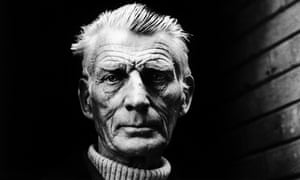
‘What did Samuel Beckett say? Fail again.’ Photograph: Jane Bown/Observer
What if I fail? It doesn’t matter. Who cares? Keep failing. It’s good for society, it’s good for you and it makes your friends feel better. What did Samuel Beckett say? “Ever tried. Ever failed. No matter. Fail again. Fail better.”
Tuesday 30 June 2015
The BBC is under threat because its success challenges market ideology
Polly Toynbee in The Guardian
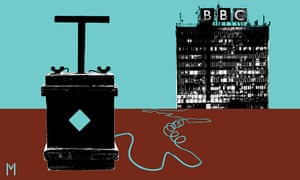
'The cuts are so severe that they risk sending the BBC into a downward spiral.' Illustration by Joe Magee
Groping for British emblems to bind together an ever more diverse and fissiparous society, politicians struggle to find cultural and emotional social glue. Make your own list from the Queen to Glastonbury, but overwhelmingly people put the NHS and the BBC right up there near the top, deep-dyed into British DNA.
But not this government. Whatever Conservatism once meant, it’s no longer about conserving precious things. The NHS staggers under the fragmenting Lansley act and the BBC is under more severe assault than ever before,threatened with licence fee cuts – and perilous charter renewal ahead. Is it payback time for Rupert Murdoch’s election support? According to BBC political editor Nick Robinson, Cameron on his battle-bus said of the BBC: “I’m going to close them down.” Joke or threat, it’s too close to what many in his party want to be laughed off. Many of the newer Tory MPs, Thatcher’s children, detest the very existence of the BBC – its phenomenal success an affront to market ideology.
Threats come thick and fast. John Whittingdale, newly promoted culture secretary, called the £145 licence fee “worse than the poll tax” in his former role as head of the culture select committee. Sajid Javid, the business secretary,complained this month that the licence fee was “a large amount for many families” and “needs looking at”. Other Tories shed crocodile tears for the poor who can’t afford the TV licence, calling for non-payment to be decriminalised – a compassion not shown to twice as many prosecuted for not paying council tax.
Decriminalisation would lose the BBC an estimated £200m a year – and that’s deliberate. The BBC may lose £600m if forced to carry the Department for Work and Pensions’ cost of exempting over-75s from the licence fee. And there’s a proposed five more static years to add to the current seven-year licence fee freeze.
The risk is that these become seen as “moderate” cuts, a “compromise” with the factions that want the BBC killed off. Yet they are so severe that they risk sending the BBC into a downward spiral, where fewer good programmes mean weakened public support, allowing yet more cuts. The loss of the Olympics to Eurosport from 2022, for an unaffordable £920m, is exactly what the BBC’s head of sport warned recently: as BBC income shrivels it can’t compete – and the licence fee looks less good value.
Barely a day goes by without the Mail, Telegraph and Rupert Murdoch’s papers attacking the BBC. This week’s Sunday Times had a full page of gleeful, barely veiled encouragement to the young not to pay their licence fee if they only watch catch-up TV on iPads or smartphones. It reported 150,000 more households in the past three months abandoned traditional TV and the licence fee, claiming not to watch it live. Everyone admits there’s a growing problem with attaching the licence fee to a TV set – but that’s easily fixed with a household fee or by bringing iPlayer under the licence.
Murdoch bullies ceaselessly for a subscription system, to shrink the BBC to the tiny size of America’s PBS. His paper’s poll shows apparent “waning” public support, with only 48% saying the licence fee is value for money, slightly more preferring funding by advertising. Left out was the inconvenient answer to one poll question which found only 9% want it funded by subscription. The BBC quotes 11 other polls showing that support for the licence fee at 42% is higher than for any other form of funding. What’s astonishing is that 96% of people use the BBC every week, spending an average of 18.5 hours watching, listening or online.
This week BBC Radio 4 launched its new season with a special celebration. With strong emphasis, its director general, Tony Hall, warned in a speech: “It’s something none of us should take for granted – there’s nothing else like it in the world.” He’s right, the station is the soundtrack to the nation, a never-ending conversation of remarkable intelligence and pleasure, reaching deep among Sun and Mirror readers, defying accusations that it’s a middle-class silo. By rights, this Reithian relic should have died out long ago: instead its listeners keep growing – up from 9 million a decade ago to 11 million now.
In the kitchen, in the car or out jogging with an iPod, I can’t imagine life without it. On a desert island, isn’t the entire back catalogue what you’d choose? The Now Show, More or Less, Neil Macgregor’s History of the World in a 100 Objects – only God and gardening have me reaching for the off button. Now here comes a whole day of poetry. Even the awfulness of the Archer family has me gripped.
Those 11 million Radio 4 adherents listen for an average of 12 hours a week – and each shining hour costs just 1.4p per listener. Nothing was ever such good value. The entire BBC has half the budget of Sky and a quarter of BT’s – which offer a fraction of the quantity or quality.
Choice busts out of every new provider – Amazon, Netflix and many more to come – yet the BBC, at £12 a month, dominates the British airwaves, while Sky charges an average £47.
The other line of attack will be on BBC governance – even though its every move is already over-policed by governors, trust and all the acronyms: Ofcom, NAO,PAC, DCLG, plus many parliamentary committees. From millions of BBC words, blunders and scandals are relatively few.
The BBC’s success infuriates its enemies because it defies Hayekian laws of gravity; the market ought to offer better value but it doesn’t. Attacks on BBC “bias” rain down: James Harding, head of BBC News, protested at the “hell on wheels” “ferocity” of attacks during the election – a little faux-naive, perhaps, from a former Murdoch editor who knows the agenda from the other side.
The BBC has a near impossible task in finding unbiased truths in an ideological world – and sometimes it splits the difference to stay on the safe side when forced to choose between sense and nonsense. The establishment leans heavily, the weight of an 85% Tory and europhobic press breathes hard to push it off its foothold. There is too often a blandifying of essential arguments when intimidation by bullies drains life out of reporting on the NHS, benefits, austerity or Europe.
Pinko bias is an illusion of the right – and voters gave Cameron his win. Before wielding axes, Tory MPs should think hard about constituents who spend 18.5 hours a week with the BBC – and of its place in national life as an unmatched cultural treasure.
Groping for British emblems to bind together an ever more diverse and fissiparous society, politicians struggle to find cultural and emotional social glue. Make your own list from the Queen to Glastonbury, but overwhelmingly people put the NHS and the BBC right up there near the top, deep-dyed into British DNA.
But not this government. Whatever Conservatism once meant, it’s no longer about conserving precious things. The NHS staggers under the fragmenting Lansley act and the BBC is under more severe assault than ever before,threatened with licence fee cuts – and perilous charter renewal ahead. Is it payback time for Rupert Murdoch’s election support? According to BBC political editor Nick Robinson, Cameron on his battle-bus said of the BBC: “I’m going to close them down.” Joke or threat, it’s too close to what many in his party want to be laughed off. Many of the newer Tory MPs, Thatcher’s children, detest the very existence of the BBC – its phenomenal success an affront to market ideology.
Threats come thick and fast. John Whittingdale, newly promoted culture secretary, called the £145 licence fee “worse than the poll tax” in his former role as head of the culture select committee. Sajid Javid, the business secretary,complained this month that the licence fee was “a large amount for many families” and “needs looking at”. Other Tories shed crocodile tears for the poor who can’t afford the TV licence, calling for non-payment to be decriminalised – a compassion not shown to twice as many prosecuted for not paying council tax.
Decriminalisation would lose the BBC an estimated £200m a year – and that’s deliberate. The BBC may lose £600m if forced to carry the Department for Work and Pensions’ cost of exempting over-75s from the licence fee. And there’s a proposed five more static years to add to the current seven-year licence fee freeze.
The risk is that these become seen as “moderate” cuts, a “compromise” with the factions that want the BBC killed off. Yet they are so severe that they risk sending the BBC into a downward spiral, where fewer good programmes mean weakened public support, allowing yet more cuts. The loss of the Olympics to Eurosport from 2022, for an unaffordable £920m, is exactly what the BBC’s head of sport warned recently: as BBC income shrivels it can’t compete – and the licence fee looks less good value.
Barely a day goes by without the Mail, Telegraph and Rupert Murdoch’s papers attacking the BBC. This week’s Sunday Times had a full page of gleeful, barely veiled encouragement to the young not to pay their licence fee if they only watch catch-up TV on iPads or smartphones. It reported 150,000 more households in the past three months abandoned traditional TV and the licence fee, claiming not to watch it live. Everyone admits there’s a growing problem with attaching the licence fee to a TV set – but that’s easily fixed with a household fee or by bringing iPlayer under the licence.
Murdoch bullies ceaselessly for a subscription system, to shrink the BBC to the tiny size of America’s PBS. His paper’s poll shows apparent “waning” public support, with only 48% saying the licence fee is value for money, slightly more preferring funding by advertising. Left out was the inconvenient answer to one poll question which found only 9% want it funded by subscription. The BBC quotes 11 other polls showing that support for the licence fee at 42% is higher than for any other form of funding. What’s astonishing is that 96% of people use the BBC every week, spending an average of 18.5 hours watching, listening or online.
This week BBC Radio 4 launched its new season with a special celebration. With strong emphasis, its director general, Tony Hall, warned in a speech: “It’s something none of us should take for granted – there’s nothing else like it in the world.” He’s right, the station is the soundtrack to the nation, a never-ending conversation of remarkable intelligence and pleasure, reaching deep among Sun and Mirror readers, defying accusations that it’s a middle-class silo. By rights, this Reithian relic should have died out long ago: instead its listeners keep growing – up from 9 million a decade ago to 11 million now.
In the kitchen, in the car or out jogging with an iPod, I can’t imagine life without it. On a desert island, isn’t the entire back catalogue what you’d choose? The Now Show, More or Less, Neil Macgregor’s History of the World in a 100 Objects – only God and gardening have me reaching for the off button. Now here comes a whole day of poetry. Even the awfulness of the Archer family has me gripped.
Those 11 million Radio 4 adherents listen for an average of 12 hours a week – and each shining hour costs just 1.4p per listener. Nothing was ever such good value. The entire BBC has half the budget of Sky and a quarter of BT’s – which offer a fraction of the quantity or quality.
Choice busts out of every new provider – Amazon, Netflix and many more to come – yet the BBC, at £12 a month, dominates the British airwaves, while Sky charges an average £47.
The other line of attack will be on BBC governance – even though its every move is already over-policed by governors, trust and all the acronyms: Ofcom, NAO,PAC, DCLG, plus many parliamentary committees. From millions of BBC words, blunders and scandals are relatively few.
The BBC’s success infuriates its enemies because it defies Hayekian laws of gravity; the market ought to offer better value but it doesn’t. Attacks on BBC “bias” rain down: James Harding, head of BBC News, protested at the “hell on wheels” “ferocity” of attacks during the election – a little faux-naive, perhaps, from a former Murdoch editor who knows the agenda from the other side.
The BBC has a near impossible task in finding unbiased truths in an ideological world – and sometimes it splits the difference to stay on the safe side when forced to choose between sense and nonsense. The establishment leans heavily, the weight of an 85% Tory and europhobic press breathes hard to push it off its foothold. There is too often a blandifying of essential arguments when intimidation by bullies drains life out of reporting on the NHS, benefits, austerity or Europe.
Pinko bias is an illusion of the right – and voters gave Cameron his win. Before wielding axes, Tory MPs should think hard about constituents who spend 18.5 hours a week with the BBC – and of its place in national life as an unmatched cultural treasure.
Wednesday 3 June 2015
How a corporate cult captures and destroys our best graduates
George Monbiot in The Guardian
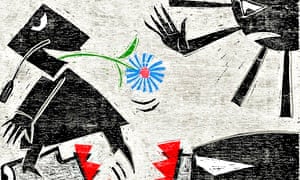 ‘
‘
People who had spent the preceding years laying out exultant visions of a better world were suddenly sucked into the mouths of corporations dangling money like angler fish.’ Photograph: Daniel Pudles
To seek enlightenment, intellectual or spiritual; to do good; to love and be loved; to create and to teach: these are the highest purposes of humankind. If there is meaning in life, it lies here.
Those who graduate from the leading universities have more opportunity than most to find such purpose. So why do so many end up in pointless and destructive jobs? Finance, management consultancy, advertising, public relations, lobbying: these and other useless occupations consume thousands of the brightest students. To take such jobs at graduation, as many will in the next few weeks, is to amputate life close to its base.
I watched it happen to my peers. People who had spent the preceding years laying out exultant visions of a better world, of the grand creative projects they planned, of adventure and discovery, were suddenly sucked into the mouths of corporations dangling money like angler fish.
At first they said they would do it for a year or two, “until I pay off my debts”. Soon afterwards they added: “and my mortgage”. Then it became, “I just want to make enough not to worry any more”. A few years later, “I’m doing it for my family”. Now, in middle age, they reply, “What, that? That was just a student fantasy.”
Why did they not escape, when they perceived that they were being dragged away from their dreams? I have come to see the obscene hours some new recruits must work – sometimes 15 or 16 a day – as a form of reorientation, of brainwashing. You are deprived of the time, sleep and energy you need to see past the place into which you have been plunged. You lose your bearings, your attachments to the world you inhabited before, and become immersed in the culture that surrounds you. Two years of this and many are lost for life.
Employment by the City has declined since the financial crash. Among the universities I surveyed with the excellent researcher John Sheil, the proportion of graduates taking jobs in finance and management consultancy ranges from 5% at Edinburgh to 13% at Oxford, 16% at Cambridge, 28% at the London School of Economics and 60% at the London Business School. But to judge by the number of applications and the rigour of the selection process, these businesses still harvest many of the smartest graduates.
Recruitment begins with lovebombing of the kind that cults use. They sponsor sports teams and debating societies, throw parties, offer meals and drinks, send handwritten letters, use student ambassadors to offer friendship and support. They persuade undergraduates that even if they don’t see themselves as consultants or bankers (few do), these jobs are stepping stones to the careers they really want. They make the initial application easy, and respond immediately and enthusiastically to signs of interest. They offer security and recognition when people are most uncertain and fearful about their future. And there’s the flash of the king’s shilling: the paid internships, the golden hellos, the promise of stupendous salaries within a couple of years. Entrapment is a refined science.
We have but one life. However much money we make, we cannot buy it back. As far as self-direction, autonomy and social utility are concerned, many of those who enter these industries and never re-emerge might as well have locked themselves in a cell at graduation. They lost it all with one false step, taken at a unique moment of freedom
Those who graduate from the leading universities have more opportunity than most to find such purpose. So why do so many end up in pointless and destructive jobs? Finance, management consultancy, advertising, public relations, lobbying: these and other useless occupations consume thousands of the brightest students. To take such jobs at graduation, as many will in the next few weeks, is to amputate life close to its base.
I watched it happen to my peers. People who had spent the preceding years laying out exultant visions of a better world, of the grand creative projects they planned, of adventure and discovery, were suddenly sucked into the mouths of corporations dangling money like angler fish.
At first they said they would do it for a year or two, “until I pay off my debts”. Soon afterwards they added: “and my mortgage”. Then it became, “I just want to make enough not to worry any more”. A few years later, “I’m doing it for my family”. Now, in middle age, they reply, “What, that? That was just a student fantasy.”
Why did they not escape, when they perceived that they were being dragged away from their dreams? I have come to see the obscene hours some new recruits must work – sometimes 15 or 16 a day – as a form of reorientation, of brainwashing. You are deprived of the time, sleep and energy you need to see past the place into which you have been plunged. You lose your bearings, your attachments to the world you inhabited before, and become immersed in the culture that surrounds you. Two years of this and many are lost for life.
Employment by the City has declined since the financial crash. Among the universities I surveyed with the excellent researcher John Sheil, the proportion of graduates taking jobs in finance and management consultancy ranges from 5% at Edinburgh to 13% at Oxford, 16% at Cambridge, 28% at the London School of Economics and 60% at the London Business School. But to judge by the number of applications and the rigour of the selection process, these businesses still harvest many of the smartest graduates.
Recruitment begins with lovebombing of the kind that cults use. They sponsor sports teams and debating societies, throw parties, offer meals and drinks, send handwritten letters, use student ambassadors to offer friendship and support. They persuade undergraduates that even if they don’t see themselves as consultants or bankers (few do), these jobs are stepping stones to the careers they really want. They make the initial application easy, and respond immediately and enthusiastically to signs of interest. They offer security and recognition when people are most uncertain and fearful about their future. And there’s the flash of the king’s shilling: the paid internships, the golden hellos, the promise of stupendous salaries within a couple of years. Entrapment is a refined science.
We have but one life. However much money we make, we cannot buy it back. As far as self-direction, autonomy and social utility are concerned, many of those who enter these industries and never re-emerge might as well have locked themselves in a cell at graduation. They lost it all with one false step, taken at a unique moment of freedom
.
We have but one life. However much money we make, we cannot buy it back.
John Sheil and I sent questions to eight of the universities with the highest average graduate salaries: Oxford, Cambridge, Imperial, the LSE, the London Business School, Warwick, Sheffield and Edinburgh. We asked whether they seek to counter these lavish recruitment drives and defend students from the love blitz. With one remarkable exception, their responses ranged from feeble to dismal. Most offered no evidence of any prior interest in these questions. Where we expected deep deliberation to have taken place, we found instead an intellectual vacuum.
They cited their duty of impartiality, which, they believe, prevents them from seeking to influence students’ choices, and explained that there were plenty of other careers on offer. But they appear to have confused impartiality with passivity. Passivity in the face of unequal forces is anything but impartial. Impartiality demands an active attempt to create balance, to resist power, to tell the dark side of the celestial tale being pummelled into the minds of undergraduates by the richest City cults.
Oxford University asked us, “isn’t it preferable that [the City] recruits bright, critical thinkers and socially engaged graduates who are smart enough to hold their employers to account when possible?”. Oh blimey. This is a version ofthe most desperate excuse my college friends attempted: “I’ll reform them from within.” This magical thinking betrays a profound misconception about the nature and purpose of such employers.
They respond to profit, the regulatory environment, the demands of shareholders, not to the consciences of their staff. We all know how they treat whistleblowers. Why should “bright, critical thinkers and socially engaged graduates” be dispatched on this kamikaze mission? I believe these universities are failing in their duty of care.

We have but one life. However much money we make, we cannot buy it back.
John Sheil and I sent questions to eight of the universities with the highest average graduate salaries: Oxford, Cambridge, Imperial, the LSE, the London Business School, Warwick, Sheffield and Edinburgh. We asked whether they seek to counter these lavish recruitment drives and defend students from the love blitz. With one remarkable exception, their responses ranged from feeble to dismal. Most offered no evidence of any prior interest in these questions. Where we expected deep deliberation to have taken place, we found instead an intellectual vacuum.
They cited their duty of impartiality, which, they believe, prevents them from seeking to influence students’ choices, and explained that there were plenty of other careers on offer. But they appear to have confused impartiality with passivity. Passivity in the face of unequal forces is anything but impartial. Impartiality demands an active attempt to create balance, to resist power, to tell the dark side of the celestial tale being pummelled into the minds of undergraduates by the richest City cults.
Oxford University asked us, “isn’t it preferable that [the City] recruits bright, critical thinkers and socially engaged graduates who are smart enough to hold their employers to account when possible?”. Oh blimey. This is a version ofthe most desperate excuse my college friends attempted: “I’ll reform them from within.” This magical thinking betrays a profound misconception about the nature and purpose of such employers.
They respond to profit, the regulatory environment, the demands of shareholders, not to the consciences of their staff. We all know how they treat whistleblowers. Why should “bright, critical thinkers and socially engaged graduates” be dispatched on this kamikaze mission? I believe these universities are failing in their duty of care.
The hero of this story is Gordon Chesterman, head of the careers service at Cambridge, and the only person we spoke to who appears to have given some thought to these questions. He told me his service tries to counter the influence of the richest employers.
It sends out regular emails telling students “if you don’t want to become a banker, you’re not a failure”, and runs an event called “But I don’t want to work in the City”. It imposes a fee on rich recruiters and uses the money to pay the train fares of nonprofits. He expressed anger about being forced by the government to provide data on graduate starting salaries.
“I think it’s a very blunt and inappropriate means [of comparison], that rings alarm bells in my mind.”
Elsewhere, at this vulnerable, mutable, pivotal moment, undergraduates must rely on their own wavering resolve to resist peer pressure, the herd instinct, the allure of money, flattery, prestige and security.
Students, rebel against these soul-suckers! Follow your dreams, however hard it may be, however uncertain success might seem.
It sends out regular emails telling students “if you don’t want to become a banker, you’re not a failure”, and runs an event called “But I don’t want to work in the City”. It imposes a fee on rich recruiters and uses the money to pay the train fares of nonprofits. He expressed anger about being forced by the government to provide data on graduate starting salaries.
“I think it’s a very blunt and inappropriate means [of comparison], that rings alarm bells in my mind.”
Elsewhere, at this vulnerable, mutable, pivotal moment, undergraduates must rely on their own wavering resolve to resist peer pressure, the herd instinct, the allure of money, flattery, prestige and security.
Students, rebel against these soul-suckers! Follow your dreams, however hard it may be, however uncertain success might seem.
Saturday 23 August 2014
The secrets of long-term love
What is the key to a happy marriage? Is there a formula for long-term love? And how do you keep the passion alive after more than 50 years together? Six happily married couples share their secrets, from never eating in front of the television to keeping some things a mystery
- Hannah Shuckburgh
- The Guardian,
Together for 56 years
Gem, 74, and Ezra Harris, 74, grew up in Glengoffe, a village in St Catherine, Jamaica. Ezra emigrated to England at 19, Gem followed him two months later, and they married in August 1958. They settled in Bradford. Ezra was a forklift driver and Gem worked in domestic service until they both retired. They have three children, Jennifer, 55, Christopher, 52 and Samantha, 45, and four grandchildren.
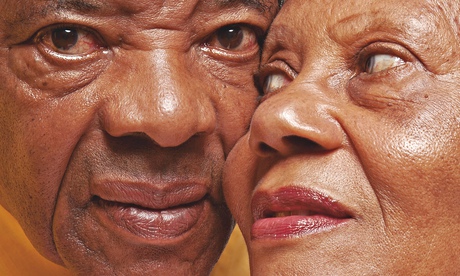 Ezra and Gem Harris: ‘ We have a good time. We used to love a dance, listen to reggae, calypso. But it’s hard now with our bad knees.’ Photograph: Bohdan Cap for the Guardian
Ezra and Gem Harris: ‘ We have a good time. We used to love a dance, listen to reggae, calypso. But it’s hard now with our bad knees.’ Photograph: Bohdan Cap for the Guardian
Ezra: Back home, people used to talk about abroad as if the whole place was paved with gold. When a plane passed overhead we would all look up and wish we were on it. One day I heard an advertisement on the radio, saying you could come to Britain and get work. It was a promise of a future. I wanted to make myself better off and be somebody.
I arrived in Bradford in June. It was supposed to be summer but I can remember the cold, the smell of the coal. The first day I was here, I felt like going back. You feel lonely; you miss your parents. I thought it would be much easier if I got a wife.
Gem had been two years below me in church school. I didn't know anything about women. My father was a preacher and very strict. I wrote to her saying I'd like to send for her to come and marry me. I hoped she'd agree and she did – she was glad to come because I bought her a ticket out of Jamaica. I knew she would make a good wife.
We didn't go back to Jamaica until 1973. Everything seemed different – smaller, farther away. It didn't feel like home. But still, after all this time, I can't get shot of my accent. Gem always tells me, "Speak English!" But you cannot teach an old dog new tricks.
Fifty-six years we have been married. You must work at it. Talk to each other. Disagree, but don't let arguments drag on. Don't go around having lots of kids with women and not looking after them. And believe in God. If you trust in Him, everything is going to be all right.
I try to be a good husband. I try not to come in with mucky hands. She worries about me passing first, and I tell her, "Don't worry about a thing." But if she goes first I will be miserable.
We're going to go on a cruise, and when I booked it the lady asked if we would like separate beds. I said, "What are you talking about, woman?" We are husband and wife. Sometimes you still get some fun!
Gem: I remember looking down from the plane as I flew into England for the first time, and seeing all this smoke coming from the chimneys. It looked as if the whole place was on fire.
Even now, I don't know how I managed to get to Bradford alone. Ezra didn't come to meet me at the station – I am still angry with him about that – so I got a taxi to his lodgings. It was just a room, really, with a coal fire and a paraffin heater.
I'd brought a wedding dress from home, and my mother's veil. I arrived on 12 August, and we married on 30 August in a register office. I missed my family very much at first, but you get used to it. The winters were hardest.
There was a lot of racism back then. People would shout, "Go back to your dirty country!" They treated you as though you were nothing. It was hurtful, but you just try to keep away from trouble.
Ezra calls me "the wife", which he shouldn't do. I'll tidy up the house and he'll go and leave crumbs. We quarrel every day, but we always make up.
He likes to cuddle, but I don't bother. I am always telling him to talk properly, but when I get mad, I talk in patois: "Shuttup and come dung ere, man!" He just laughs.
We have a good time. We used to love a drink and a dance at the African-Caribbean centre, listen to some reggae, some calypso – but it is upstairs and it's hard to get up there now with our bad knees. On Sundays I'll always cook Jamaican food for the family – curried goat, rice and peas, but always with yorkshire pudding, too.
Together for 52 years
 Mick and Barbara Wilson: ‘ I know many couples can’t survive such loss, but we could always talk and cry together.’ Photograph: Bohdan Cap for the Guardian
Mick and Barbara Wilson: ‘ I know many couples can’t survive such loss, but we could always talk and cry together.’ Photograph: Bohdan Cap for the Guardian
Barbara, 72, and Mick Wilson, 79, met in 1960 and married in 1962. Their eldest daughter, Sarah, died in a white-water rafting accident 14 years ago in Peru, when she was 36. Barbara is a neuropsychologist; Mick is a retired English teacher, and they live in Bury St Edmunds. They have two surviving children, Anna and Matthew, and four grandchildren.
Barbara: I was in my first year at teacher-training college when Mick, in the year above, invited me to his room for coffee. "Mick Wilson never invites people for coffee," a friend told me. He gave me a large German beer mug full of Nescafé; I think he wanted to make a good impression.
Mick thought we should wait to have children, but I decided we shouldn't. We were hippies: no TV, no car, we made our own bread. Mick had long hair and a beard and wore bell-bottoms. We had lots of cats and stick insects. I was a housewife, but Mick wanted me educated. I took my psychology A-level when I was 29, then a degree, a master's, and a PhD.
In 2000, I was leaving work when a colleague said, "Mick's on his way over." I just knew something awful had happened. Maybe it's the cat, I thought. Please let it be the cat. Mick called from the motorway. "There's terrible news." Some part of me already knew. "Is it Sarah? Is she dead?" He said, "I think so."
We somehow got through that night. Some kind of madness takes over. It's anguish, grief and everything in between. We took turns to be strong, I think. We talked and cried and held each other. We arranged to go out to Peru the following week and Mick paid £10,000 for a helicopter to look for Sarah's body. It was pointless, of course, but I knew he needed to do it, so I let him. Sarah has never been a taboo: we talk about her every day.
Mick: It was always a strong marriage. We've done daft things, of course. Back in the old, hippy days we thought we wanted an open marriage, but we tried it once or twice and it didn't work out for us. It taught us both that the best kind of arousal comes through affection, not sex with just anyone.
Our daughter Sarah's marriage had broken down after years of failed fertility treatments and she went to Peru to rethink her life. To this day, we've never had a body to bury. We won't ever have closure. You can learn to live with it, but you'll never close the book. I know many couples find their relationship can't survive this kind of loss, but ours did because we could always talk to each other and cry together.
We are in our old age now and, the way we see it, we've lived a happy life, apart from one terrible tragedy. We have two wonderful children, and four grandchildren. To have the marriage we have, the life we have together, I think we've been very privileged.
Together for 36 years
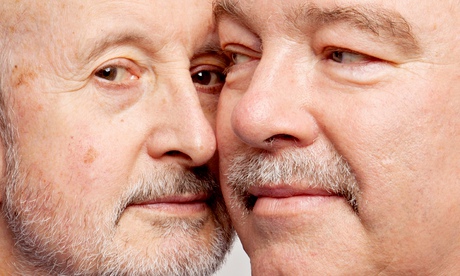 Howard Shepherdson (left) and Rod Marten: ‘ We have no separate lives. We spend every day together and it never gets boring.’ Photograph: Bohdan Cap for the Guardian
Howard Shepherdson (left) and Rod Marten: ‘ We have no separate lives. We spend every day together and it never gets boring.’ Photograph: Bohdan Cap for the Guardian
Rod Marten, 71, and Howard Shepherdson, 60, met in a pub in London in 1978. Rod is a retired tax inspector; Howard is a semi-retired management consultant. They were the UK's first same-sex couple to be legal long-term foster parents; their son, Glen, is 43. Rod and Howard have two grandchildren, and have been civil partners since 2005. They live in Ealing, west London.
Howard: I had always thought the idea of love at first sight was a cliche. But one Thursday night in 1978, that's what happened. I spotted Rod at the bar and it was just lovely from the moment we started chatting. I went home to my parents in Sussex that weekend feeling quite delirious. I thought, "What is this?" It was like catching pneumonia.
In 1985 I was a school counsellor and had been working with a 14-year-old boy, Glen, from a children's home. One day, Glen just asked me: "Will you be my dad?" I thought it was best to be honest with him, so I said I was afraid it was impossible, because I'm gay. Glen said, "Why should that matter?" And it struck a chord. Rod and I decided we might as well try. No gay couple had formally adopted – or long-term fostered, as we did – before. It was very strengthening, loving someone together and them loving you back. He now lives in France with his wife, Isabelle. We visit all the time, and Skype. Having grandchildren has been a deeply enriching experience for us.
Rod and I are not at all independent of each other. We have no separate lives. We spend every day together and it never gets boring. Yes, sex does start to slow down at our age, but physical intimacy shouldn't. We still curl up on the sofa together, as we have done for ever. There's just one thing we avoid completely as it would mean instant divorce – DIY.
Rod: When I went into work the day after I'd met Howard, a colleague said I seemed different, extra-happy. I was. We met in September and by December we were looking to buy a flat together. I think my family thought it was a bit soon, but we're still in the same flat, 36 years later.
In the 80s, being openly gay on the street was not something you felt particularly secure doing. We've never walked around holding hands. If we were 21 now we'd do it, but you can't just start doing that in your 60s. Getting our civil partnership was a political statement, but as the date got closer, it felt very romantic.
I think relationships need rules. Work must never dominate your life. We never go to sleep on an argument. I am a terrible procrastinator, and Howard is an over-organiser, but you have to learn to love the other person for who they are, and not be frustrated by what you want them to be. It's no good being perpetually disappointed. Our other absolute rule is that we never, ever eat dinner in front of the television. We haven't done it once in 36 years.
Together for 40 years
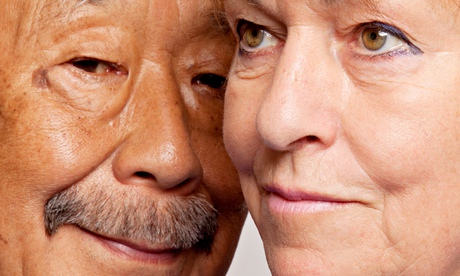 Setsuo Kato and Jill Fanshawe Kato: ' We’ve both had admirers over the years, but we have got strong self-discipline.’ Photograph: Bohdan Cap for the Guardian
Setsuo Kato and Jill Fanshawe Kato: ' We’ve both had admirers over the years, but we have got strong self-discipline.’ Photograph: Bohdan Cap for the Guardian
Jill Fanshawe Kato, 68, and Setsuo Kato, 72, met in London in the early 70s and married in Tokyo in 1974. They spent two years living in Japan before moving back to the UK and settling in north London. Setsuo is a freelance photojournalist; Jill is a potter.
Jill: I had visited Japan in my 20s and found it a very chauvinistic place. But I'd got quite far with my Japanese and wanted to carry on learning, so I joined an evening class in Holborn. Setsuo turned up one night to interview students for an article that he was writing.
Luckily for us, our families were very supportive. We had a traditional Japanese wedding in Tokyo. I wore a pink kimono with kanzashi hair ornaments.
I think after all these years together, I have started looking a bit Japanese. I've always used kohl round my eyes, and I like to wear Japanese textiles. I suppose it's attitude and behaviour, too. I'm from Devon, but British people can never tell where I'm from.
We never had children – perhaps that is the thing that has kept us together, and given us greater independence. We've both had admirers over the years, but we have got strong self-discipline. You need to be kind to each other, remember the value of what you have.
There should always be an unknown area of your partner. There is a lot of mystery about Setsuo. We would never go to the loo in front of each other; there is privacy and respect between us. We've lived in this house for more than 30 years, but Setsuo has never once gone into my studio at the top of the house. We are probably still finding things out about each other, even now.
Setsuo: Japanese men who travelled to London in those days were not mainstream – we were adventurous types. It wasn't as if you just hopped on a plane. I'd caught a Russian boat from Yokohama, and took the Siberian railway all the way to London.
I have lived here a long time, but I always consider myself Japanese. I am not very good at being physically affectionate. I am a bit better at it than most Japanese men, but I don't talk about my feelings. I don't lose my temper.
Jill and I give each other huge freedom. Jill will often go abroad for a month or two to work, and I enjoy a social life more than her – I zoom off and come back as I wish. We've always said we face the world back to back.
I think you have to be patient. When life is down, people think changing partners will help – but I'm not convinced anyone is better off in the long run. It would just be awful to have to start again.
We are like two trees that have grown together; our roots are entwined.
Together for 59 years
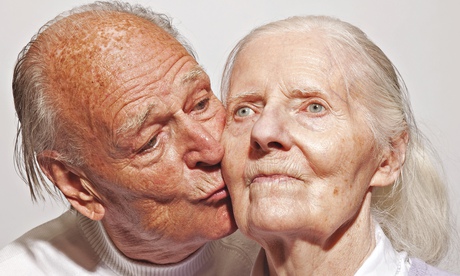 Patrick and Doreen Skilling: ‘ We married at the Savoy, way above our station.' Photograph: Bohdan Cap for the Guardian
Patrick and Doreen Skilling: ‘ We married at the Savoy, way above our station.' Photograph: Bohdan Cap for the Guardian
Doreen, 89, and Patrick Skilling, 86, married in 1955. They lived in Notting Hill for 50 years; Patrick was an advertising executive and Doreen designed wallpaper for Biba. In the 70s, the couple gave up their jobs to run a furniture stall together in Portobello Market. Doreen was diagnosed with Alzheimer's in 2006 and they now live together at the Sunrise care home in Beaconsfield.
Patrick: A colleague had been trying to take Doreen out. He said to me, "Take this bird out, will you? I can't handle her." So I took her for a drink. I was wildly impressed. We dated for five years and were married in the Queen's Chapel at the Savoy. It was way above our station, but Doreen somehow managed it.
We always thought we would have children, but by the time we realised it probably wasn't going to happen, it was too late. We weren't sad about it at the time – it wasn't something we even talked about – but now I think it may have been the greatest tragedy of our lives. When I see Doreen cuddling a doll now, I wonder whether it may have affected her more than she let on, that there might be a deeper sense of loss.
I was earning good money in advertising, smoking and drinking too much. I'm sorry to say I failed her many times; falling into the pitfalls that husbands do. But Doreen was always very patient. We decided I'd leave my job and we'd become business partners. So we took a stall in Portobello Market, and started selling antiques and junk furniture. It revitalised our married life. We had time to talk.
Ten years ago, I started to notice Doreen was having problems with numbers. She couldn't sort out the change. It was two years before we got a diagnosis, that she had Alzheimer's. She has never really understood what is happening to her. The change in her was slow and almost imperceptible. But I wept for her. It was so dreadful that such a lovely person should face such a thing.
All along I'd assumed we'd stay at home. But after six years, she developed problems I just couldn't cope with. She moved into a home, and for two months I visited her every day. It was obvious from day one that I should live there, too. I wanted to continue being important in her life. Selling our house was like losing another partner. You mourn for these things, as if they were human; the conservatory full of plants we'd tended together, all her paintings.
Doreen lives on a secure wing, and I have a separate room. She doesn't communicate at all now. She sits around looking lovely. I envy her tranquillity. I go up every day. She doesn't know it's me – Pat, her husband – but I think she thinks I'm a friendly face. That's good enough for me. I just cherish what's left.
Now I must fill my days. I walk, garden, do my stamp albums. I don't want to sit slumped on a chair, like everyone else here. And Doreen, she'll just fade away. She won't be afraid of it. But I'll be shattered. Inertia will probably keep me here after she's gone. I am 86, and it's just too daunting to find a new house. But you live day by day. It's hard to live any other way.
Together for 73 years
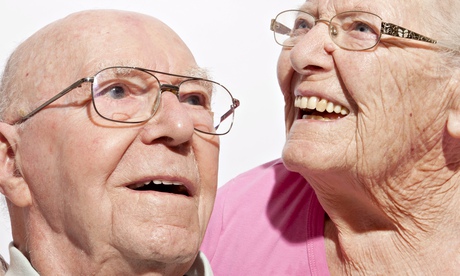 Fred and Gladys Croft: ‘ It will come some day, life without each other. We don’t like to think about it’ Photograph: Bohdan Cap for the Guardian
Fred and Gladys Croft: ‘ It will come some day, life without each other. We don’t like to think about it’ Photograph: Bohdan Cap for the Guardian
Gladys, 100, and Fred Croft, 96, met at a dance in New Malden, south-west London, in 1931. Gladys was a factory worker; Fred an engineer who then joined the air force. They married in 1940, before Fred was posted abroad. After the war, Fred worked for the NHS, and the couple settled in the London suburbs. They have a daughter, Audrey, 69, and a grandson, Iain, 41. They live in couples' accommodation in the Acacia Mews care home in St Albans.
Gladys: My mother died of an asthma attack when I was 18, and my father remarried and went off with his new family. He paid our rent, but we never saw him again. My youngest sister was only eight, so we had to bring ourselves up – five sisters in a small flat in Raynes Park.
I would go out with the girls I worked with at the weekend. We'd always have a good laugh. That's where I saw Fred for the first time, at a dance. I loved dancing back then.
We got married just before he left for the war and I wore a wedding dress that three of my sisters had already worn. We didn't have many guests, just my sisters and Fred's mum, who had made a fruitcake.
I didn't want children during the war, because so many fathers didn't come back, you see. You can't think the worst, but my sister's husband was killed in the war – terribly sad.
Audrey was born in May 1946. It was too late to have any more children, because I was so old – 32. We decided that we wouldn't have any more.
We've had some wonderful holidays. Fred would often surprise me by booking a hotel for the weekend. We both love seeing places – Denmark, Spain, Ireland – but we'd never take a package tour. We liked to do it ourselves, see a lot of things.
We don't get flustered; I think that's the secret. Fred is very easy-going. He'll go into the garden and I'll leave him be. He has been a good husband, and I think I've been a good wife.
We haven't had difficult times or problems like many other people have – we've had good health, nice holidays, and we've worked hard. We've done everything together, and always had each other. We've never been lonely. I have never been unhappy in all my life. You have to make your own pleasures, don't you?
Fred: There's nothing magical about it, really. We've just lived a normal life. If you've got problems, you sort them out. We have arguments, but we've never had a row. Not a proper one.
Yes, there are things we would have liked to have, but if we couldn't afford it, we didn't buy it. We never bought a house. Borrowing money makes for trouble. I've met two people in my life with plenty of money and they've never been happy. Money causes terrible worries for people.
The things you saw in the war, they shaped you. These days, youngsters don't seem satisfied with life. They think nothing of getting married three times. Our grandson, Iain, is divorced. I think you've got to try to be happy with what you have. Don't always be looking elsewhere. Don't aim for the moon.
I've always let Gladys do what she pleased. If she wanted to go out with the girls, she just went. I didn't worry. But I've always included her in my interests, that's the thing. I love boats, and we had wonderful barge holidays together for 30 years.
It'll come some day, life without each other. We don't like to think about it. Gladys gets panic attacks. I can't stand up on my own any more, so I can't help her. It's terrible to watch. I wouldn't want to be without her.
Friday 30 May 2014
'In cricket, if you allow yourself to relax, you'll be swept away' Saeed Ajmal
Umar Farooq's interview with Saeed Ajmal in Cricinfo
Everyone in Pakistan either wants to be a fast bowler or a batsman. How did you end up a spinner?
I was a fast bowler until 15. I used to play mostly with a tennis ball covered in vinyl electrical tape. My school captain Maqsood Ahmed encouraged me to try off spin. He felt I might be more successful as a spinner. He probably noticed that my height and build weren't good for fast bowling. It was a breakthrough. So here I am.
I was a fast bowler until 15. I used to play mostly with a tennis ball covered in vinyl electrical tape. My school captain Maqsood Ahmed encouraged me to try off spin. He felt I might be more successful as a spinner. He probably noticed that my height and build weren't good for fast bowling. It was a breakthrough. So here I am.
What does cricket mean to you?
Cricket is a tough game. I would say 90% of the time it makes you cry, but the 10% that forms the good parts is truly worth it. The key to success, I think, is to bear the bad days with a smile. If you can do that, the good days become more and more frequent.
Cricket is a tough game. I would say 90% of the time it makes you cry, but the 10% that forms the good parts is truly worth it. The key to success, I think, is to bear the bad days with a smile. If you can do that, the good days become more and more frequent.
You made a relatively late entry into international cricket, playing your first Test when nearly 32. How come?
I cannot tell why I took so long and who and what were the forces that delayed my entry into international cricket. I'd rather focus on my present and future rather than cursing my past. God has given me this personal quality of shrugging off failure quickly and not taking disappointments to heart. That's just the way I am and this approach has helped me greatly in life. I simply refuse to be disappointed.
I cannot tell why I took so long and who and what were the forces that delayed my entry into international cricket. I'd rather focus on my present and future rather than cursing my past. God has given me this personal quality of shrugging off failure quickly and not taking disappointments to heart. That's just the way I am and this approach has helped me greatly in life. I simply refuse to be disappointed.
How did you master the doosra?
I learned to bowl the doosra by watching video footage of Saqlain Mushtaq's bowling during my days in England playing league cricket. I never got any direct tips from him but I closely studied him bowling the doosra on video.
I learned to bowl the doosra by watching video footage of Saqlain Mushtaq's bowling during my days in England playing league cricket. I never got any direct tips from him but I closely studied him bowling the doosra on video.
But way before that, Aqeel Ahmed, who played for Faisalabad, could bowl a pretty good one. Variation is a key weapon for any spinner. I used to watch Aqeel take wicket after wicket with his doosra and I wanted to do the same. I felt confident that if he can do it I could too.
Is it still a problem for you to bowl to left-handers?
During the early phase of my career it was. It had almost become a mental block. Left-handers are supposed to be fearful of offspinners, but I could see that I wasn't making them afraid. It became very frustrating for me and I knew I had to do something about it. I thought to myself, I have this ball in my hand, that's my biggest weapon; why am I not able to use this weapon effectively against left-handers? I worked hard at the problem, going to the nets and bowling at left-handed batsmen for long periods. Allah was kind and I was able to work out my deficiencies. Over the last year and a half to two years, it has ceased to be a problem. I came at the problem with a positive mental attitude. I fine-tuned my doosra for left-hand batsmen.
During the early phase of my career it was. It had almost become a mental block. Left-handers are supposed to be fearful of offspinners, but I could see that I wasn't making them afraid. It became very frustrating for me and I knew I had to do something about it. I thought to myself, I have this ball in my hand, that's my biggest weapon; why am I not able to use this weapon effectively against left-handers? I worked hard at the problem, going to the nets and bowling at left-handed batsmen for long periods. Allah was kind and I was able to work out my deficiencies. Over the last year and a half to two years, it has ceased to be a problem. I came at the problem with a positive mental attitude. I fine-tuned my doosra for left-hand batsmen.
Do you fear that overusing the doosra might make you predictable?
I don't think I overuse it. When I look at the left-handers I've dismissed over the last two years, 70% have fallen to the doosra. I use it because it works. To me, that's effective use, not overuse. If I find that a batsman is uncomfortable against the doosra, I'll bowl exactly that to him, even if I end up bowling ten doosras in a row.
I don't think I overuse it. When I look at the left-handers I've dismissed over the last two years, 70% have fallen to the doosra. I use it because it works. To me, that's effective use, not overuse. If I find that a batsman is uncomfortable against the doosra, I'll bowl exactly that to him, even if I end up bowling ten doosras in a row.
We heard you were offered the Pakistan captaincy.
I don't want to put myself forward for captaincy. I think I am better as a team player. I do think about being captain of Pakistan, but I am reluctant too. Captaincy in Pakistan is not easy. The captain ends up being blamed for anything that goes wrong. Just look at Mohammad Hafeez. He resigned after our exit from this year's World T20. Why? It's because all the blame was being dumped on him. I have been approached for captaincy but I declined. I want to be relaxed about my cricket. God has blessed me with a sunny disposition and I want to keep it that way.
I don't want to put myself forward for captaincy. I think I am better as a team player. I do think about being captain of Pakistan, but I am reluctant too. Captaincy in Pakistan is not easy. The captain ends up being blamed for anything that goes wrong. Just look at Mohammad Hafeez. He resigned after our exit from this year's World T20. Why? It's because all the blame was being dumped on him. I have been approached for captaincy but I declined. I want to be relaxed about my cricket. God has blessed me with a sunny disposition and I want to keep it that way.
Misbah-ul-Haq has been outstanding in this role. In fact, when you consider the circumstances in which he has performed his job, I would say his services as captain are greater than even Imran Khan's. Yet he doesn't always receive his due. He's been a tremendous leader during an extremely difficult time for Pakistan and he's been our leading run getter. Yet each time we lose a match, people forget about his magnificent contributions. They start demanding that he be dropped. I really fail to understand this. Even as a batsman, people complain he's too slow, that he blocks a lot, does a lot of tuk-tuk. This is not fair to Misbah. He is a watchful batsman and becomes extra-watchful if the team is losing wickets from the other end, which often happens with us. His approach is appropriate and serves the interests of the team. I can tell you as a bowler that it pleases me greatly to see Misbah standing at the crease. If he is batting, it gives me heart that I will have runs to bowl at.
| "As a bowler that it pleases me greatly to see Misbah standing at the crease. If he is batting, it gives me heart that I will have runs to bowl at" | |||
Don't you think Misbah is over-reliant on you and that this keeps you under pressure all the time?
I agree that they rely heavily on me. This is a responsibility I accept with a sense of honour and humility. I am there to be used as and when my captain needs. I am never sure which overs I'm going to bowl, when I'm going to get called upon. I remain alert all the time, ready to serve. All I know is that whenever my captain calls on me, I have to give it everything. There was a time when I used to feel anxious that I could get called upon unpredictably, but I no longer feel any pressure about it.
I agree that they rely heavily on me. This is a responsibility I accept with a sense of honour and humility. I am there to be used as and when my captain needs. I am never sure which overs I'm going to bowl, when I'm going to get called upon. I remain alert all the time, ready to serve. All I know is that whenever my captain calls on me, I have to give it everything. There was a time when I used to feel anxious that I could get called upon unpredictably, but I no longer feel any pressure about it.
Cricket is a team game, so you obviously can't get five or ten wickets all the time. Others too have to respond to contribute.
Whether it's the first over or the last, whether the boundary is short or long, whether the batsman is new or well-set, I always answer the call of my captain. I would never say, hey, that's a short boundary over there, I don't want to bowl from this end. That's just not me. I have a sense of duty about it. Whenever I'm called upon, my answer always is, come on, give me the ball.
Whether it's the first over or the last, whether the boundary is short or long, whether the batsman is new or well-set, I always answer the call of my captain. I would never say, hey, that's a short boundary over there, I don't want to bowl from this end. That's just not me. I have a sense of duty about it. Whenever I'm called upon, my answer always is, come on, give me the ball.
You can never relax in cricket. You have to keep working at the game all the time, keep trying and learning new things. If you allow yourself to relax, you'll be swept away. It's an unpredictable game. You can never be sure of what's going to happen next. It can also be a cruel game. It can give you a lot of heartache.
You have never played Test cricket in your country. How does that feel?
It is perhaps the greatest misfortune of my career that I have been forced to play nearly all my international matches outside Pakistan. I have played over 200 international matches by now and only three have been in Pakistan. None of my 33 Tests has been in Pakistan.
It is perhaps the greatest misfortune of my career that I have been forced to play nearly all my international matches outside Pakistan. I have played over 200 international matches by now and only three have been in Pakistan. None of my 33 Tests has been in Pakistan.
I grew up watching many Tests at Iqbal Stadium, in my home town of Faisalabad, and used to dream of one day playing there myself. That has yet to happen. I can't say if it ever will. I am extremely keen to play in front of my own people. Few things would give me greater joy. I keep praying for the quick return of international cricket to Pakistan. If it happens after my retirement, it will leave me very sad indeed. I do agree that our team has nicely managed to adopt the UAE as a second home, but my heart still aches with the desire to play at home. I want to see the intensity of support I am able to attract here. That is something I would like to experience. We have played our so-called home matches in a number of locations, including the UAE, England, Sri Lanka, and even New Zealand. These locations have all been welcoming and provided top-notch facilities, but they aren't home. It's different when I come to Pakistan. Just breathing the air here makes me feel better.
As one of the world's top spinners, do you miss playing in the IPL?
No doubt it would be better for us if we could be included in the IPL. But the loss is only financial. We're all playing a good deal of cricket as it is, so we're not losing out on that count. But yes, Pakistani players fully deserve to be included in the IPL. I can understand why they might want to exclude us from matches inside India, but the IPL has now been exported to South Africa and the UAE. There should be no hesitation in including us when the games are being played outside India. I would even ask the IPL organisers to host matches in Pakistan. Why not? It would be good for the fans and our players would benefit. It will reveal the close bond and mutual affection that exists between Indians and Pakistanis. That is what should be allowed to truly define the relationship between our countries.
No doubt it would be better for us if we could be included in the IPL. But the loss is only financial. We're all playing a good deal of cricket as it is, so we're not losing out on that count. But yes, Pakistani players fully deserve to be included in the IPL. I can understand why they might want to exclude us from matches inside India, but the IPL has now been exported to South Africa and the UAE. There should be no hesitation in including us when the games are being played outside India. I would even ask the IPL organisers to host matches in Pakistan. Why not? It would be good for the fans and our players would benefit. It will reveal the close bond and mutual affection that exists between Indians and Pakistanis. That is what should be allowed to truly define the relationship between our countries.
There has lately been some talk about reviving bilateral series between India and Pakistan. I would love to see that. I dearly hope it happens.
You predicted you'd take a ten-wicket haul in Cape Town last year before the start of the match. How did you feel it coming?
The first thing I do whenever I arrive at any ground is to go look at the pitch. At the start of the Cape Town Test, a commentator and a TV cameraman were standing there doing a pitch report. When I saw the surface I couldn't help rubbing my hands in glee. The camera managed to get a shot of me rubbing my hands together. It appeared to be a pitch tailor-made for me. I can't explain it in words and I can't tell you what I saw in that pitch that made me feel this way, but I sensed I would be taking wickets.
The first thing I do whenever I arrive at any ground is to go look at the pitch. At the start of the Cape Town Test, a commentator and a TV cameraman were standing there doing a pitch report. When I saw the surface I couldn't help rubbing my hands in glee. The camera managed to get a shot of me rubbing my hands together. It appeared to be a pitch tailor-made for me. I can't explain it in words and I can't tell you what I saw in that pitch that made me feel this way, but I sensed I would be taking wickets.
It was just this realisation that arose from somewhere deep inside. It just happens that way sometimes in cricket. If you're a batsman, there are days when you'll play your first scoring shot and right away you can sense you'll be making a hundred today. That's the kind of feeling that Cape Town pitch gave me. I took ten wickets in that game, so it proved correct.
Did you lose faith in technology in cricket after Sachin Tendulkar was not given out off your bowling in the 2011 World Cup?
I was left dumbfounded when Hawk-Eye gave Tendulkar not out in the semi-final in Mohali. As I understand it, the way the system was set up back then, it was controlled by a producer who could influence the images. Now it has been improved and the technical people are required to present all the available angles to the third umpire without editing.
I was left dumbfounded when Hawk-Eye gave Tendulkar not out in the semi-final in Mohali. As I understand it, the way the system was set up back then, it was controlled by a producer who could influence the images. Now it has been improved and the technical people are required to present all the available angles to the third umpire without editing.
I am telling you: Sachin was 100% out. He was lbw. As far as I am concerned, it did not reflect the truth of the event. In fact, this is not just my view, it is what the entire cricket world thinks. But we move on and so does the technology. I believe it is evolving and learning from its mistakes. I am fine with it.
What encouraged you to start a cricket academy in Faisalabad?
Pakistan has immense cricketing talent but we lack proper facilities. This is where the PCB should place its energies and focus. My effort to establish a properly equipped and organised cricket academy is also motivated by this concern. I am eager to get it done while I am still active internationally. I know nobody will give me the time of day after I retire. So time is short and I need to be efficient and take advantage of the opportunity. The Faisalabad authorities and the leadership of the Agricultural University have been most helpful. I am extremely grateful to them.
Pakistan has immense cricketing talent but we lack proper facilities. This is where the PCB should place its energies and focus. My effort to establish a properly equipped and organised cricket academy is also motivated by this concern. I am eager to get it done while I am still active internationally. I know nobody will give me the time of day after I retire. So time is short and I need to be efficient and take advantage of the opportunity. The Faisalabad authorities and the leadership of the Agricultural University have been most helpful. I am extremely grateful to them.
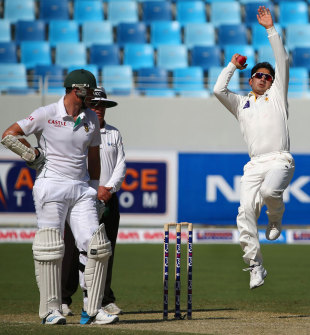
| |||
The country used to be known for its fast bowlers but your success might change that.
I would agree that the quality of seam bowlers from Pakistan has declined somewhat. I think the reason is that we have started making green and bowler-friendly wickets in domestic matches. In the old days, the wickets were dead and bowlers had to try hard to succeed. They were forced to learn tricks and skills. After all this toil they would come into the international arena and find helpful wickets and they would be able to dominate easily. Now the situation is reversed. Our bowlers are being raised on seaming surfaces. They perform adequately on green pitches, but if they come across a batting wicket they are unable to adjust and end up getting badly punished. I would advise the PCB to favour batting surfaces in our domestic set-up. It will certainly be good for the bowlers - both spinners and seamers - and I am sure it will produce a few great batsmen too.
I would agree that the quality of seam bowlers from Pakistan has declined somewhat. I think the reason is that we have started making green and bowler-friendly wickets in domestic matches. In the old days, the wickets were dead and bowlers had to try hard to succeed. They were forced to learn tricks and skills. After all this toil they would come into the international arena and find helpful wickets and they would be able to dominate easily. Now the situation is reversed. Our bowlers are being raised on seaming surfaces. They perform adequately on green pitches, but if they come across a batting wicket they are unable to adjust and end up getting badly punished. I would advise the PCB to favour batting surfaces in our domestic set-up. It will certainly be good for the bowlers - both spinners and seamers - and I am sure it will produce a few great batsmen too.
What have been the highs and lows of your career so far?
The best moment of my career, I will say, is the 3-0 Test whitewash over England in the UAE in early 2012.
The best moment of my career, I will say, is the 3-0 Test whitewash over England in the UAE in early 2012.
There have, of course, been a number of bad moments too. Losing last year's Cape Town Test against South Africa, despite my ten wickets, was a terrible blow. There is the ODI against South Africa in Sharjah last year, where I took four wickets and we had a modest target to chase, but we had an awful collapse, losing the last six batsmen for only 16 or 17.
And of course, there is the last over I bowled to Michael Hussey in the 2010 World T20 semi-final.
But I would say the absolute worst match of my career was a Test against West Indies in the summer of 2011. I took 11 wickets in that game. Despite conceding a first-innings lead, we had a reasonably modest fourth-innings target and we still lost. That hurt deeply. It still hurts when I think about it. I had this bagful of wickets but it gave me no real sense of achievement.
How do you expect Pakistan to do in the 2015 World Cup?
The next World Cup remains less than a year away. I have a feeling its location in Australia and New Zealand is going to suit us. My prediction is we are going to do well. Our batsmen have a flair for playing shots on bouncy wickets. They love to cut, for example. The Akmal brothers Umar and Kamran, opener Ahmad Shehzad, even Hafeez, and the newcomer Sohaib Maqsood - they are all happy on bouncy tracks. They all love it when the ball comes quickly onto the bat.
The next World Cup remains less than a year away. I have a feeling its location in Australia and New Zealand is going to suit us. My prediction is we are going to do well. Our batsmen have a flair for playing shots on bouncy wickets. They love to cut, for example. The Akmal brothers Umar and Kamran, opener Ahmad Shehzad, even Hafeez, and the newcomer Sohaib Maqsood - they are all happy on bouncy tracks. They all love it when the ball comes quickly onto the bat.
Subscribe to:
Posts (Atom)